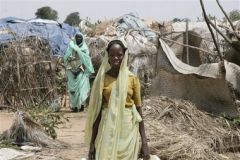South Darfur governor expels UN humanitarian official – UN
Novemeber 7, 2007 (UNITED NATIONS) — The governor of South Darfur ordered the U.N. humanitarian director to leave the state, which has been the scene of recent fighting and where the United Nations plays a key role in coordinating aid to almost 1 million people, the U.N. said Wednesday.
 U.N. deputy spokeswoman Marie Okabe said the U.N. official has not been ordered to leave the country by the government in Khartoum, “but rather has been forced to leave South Darfur.”
U.N. deputy spokeswoman Marie Okabe said the U.N. official has not been ordered to leave the country by the government in Khartoum, “but rather has been forced to leave South Darfur.”
“This is a directive from the state governor and is being taken up … with central authorities in Khartoum,” she said. “The United Nations is extremely concerned about the potential ramifications of this decision” because the U.N. Office for the Coordination of Humanitarian Affairs, known as OCHA, “plays a pivotal role in South Darfur.”
OCHA spokeswoman Stephanie Bunker identified the director of OCHA’s office in South Darfur as Wael Al-Haj Ibrahim, a Canadian. She said he left the state capital, Nyala, earlier this week and was now in Khartoum.
South Darfur’s Governor Ali Mahmood Mohammed said in a letter asking Ibrahim to leave that “he was not complying with the rules of humanitarian action,” Bunker said.
She said the U.N. humanitarian coordinator for Sudan, Ameerah Haq, will take up the governor’s order with the government in Khartoum.
Okabe said OCHA plays a key role in South Sudan, working with the government, U.N. agencies, voluntary organizations and the donor community to coordinate assistance to up to 1 million people uprooted from their homes.
“This is particularly of concern because it violates the letter and the spirit of the joint communique on the facilitation of humanitarian asssitance in Darfur” signed by the U.N. and the government in late March, and a communique signed by U.N. Secretary-General Ban Ki-moon and Sudanese President Omar al-Bashir in early September, Okabe said.
Violence erupted in Darfur in western Sudan in early 2003, when rebels from Darfur’s ethnic African majority took up arms against the Arab-dominated government.
Critics accuse Sudan of retaliating by arming local Arab militias known as the janjaweed, and the government is blamed for widespread atrocities against civilians. The government denies any guilt, but a cabinet minister and a janjaweed chief have been charged with crimes against humanity by the International Criminal Court in The Hague.
More than 200,000 people have been killed in the violence, and an estimated 2.5 million civilians have fled to refugee camps in Darfur and neighboring countries.
The gravity of the situation was highlighted last month when a U.N. statement cited reports of dozens of civilians killed, injured or missing in the rebel-held town of Muhajeria in South Darfur that was attacked by Arab militias days earlier.
The U.N. said the town was partly burned and looted and that its 20,000 inhabitants had fled. Rebels have said at least 48 were killed in the government attack, and aid groups counted at least 40 seriously injured.
(AP)
